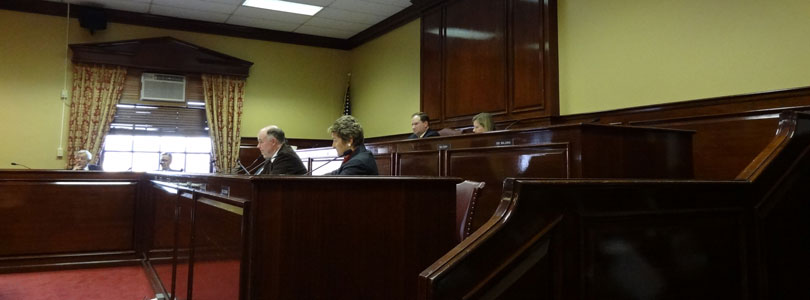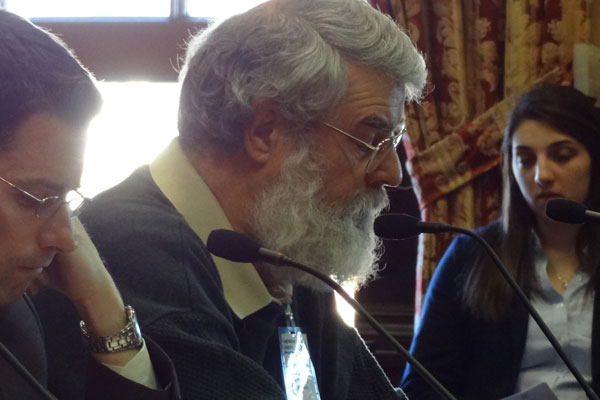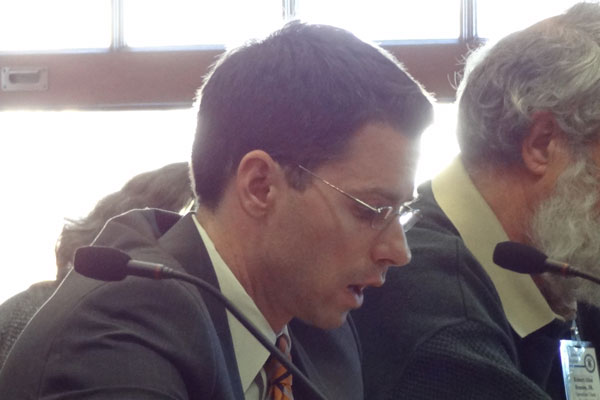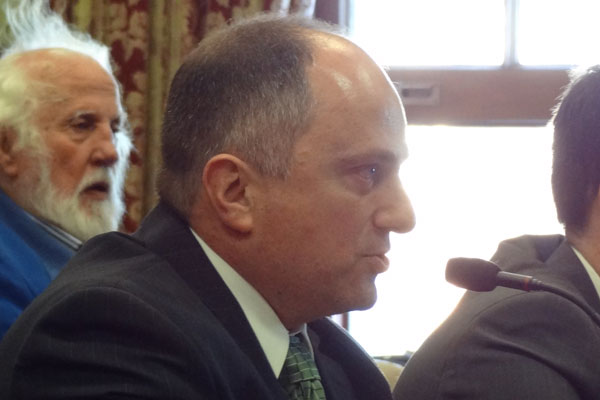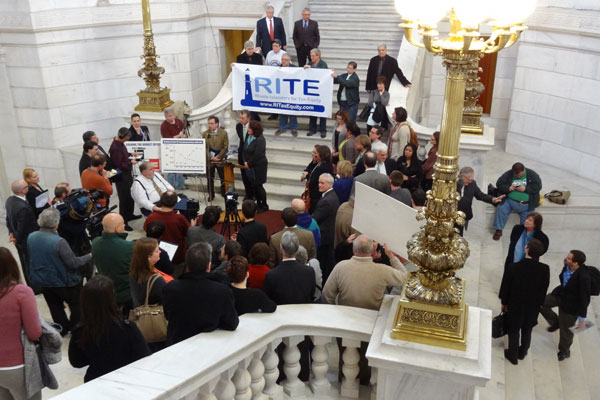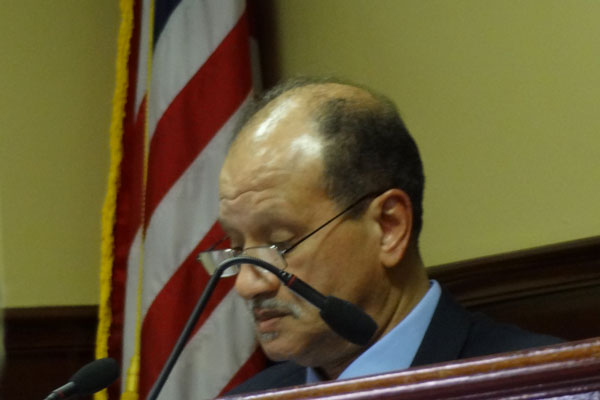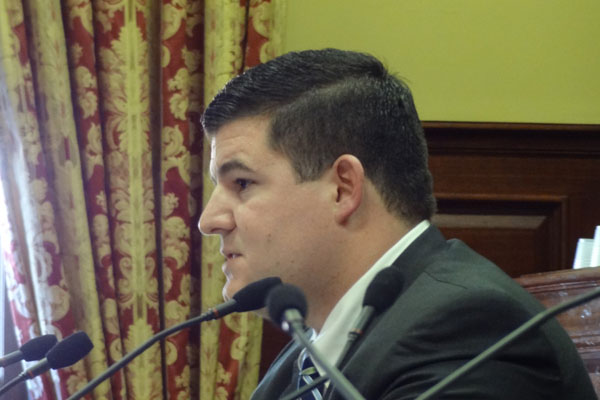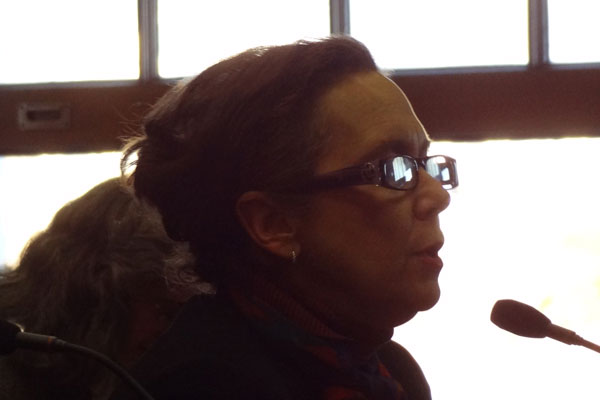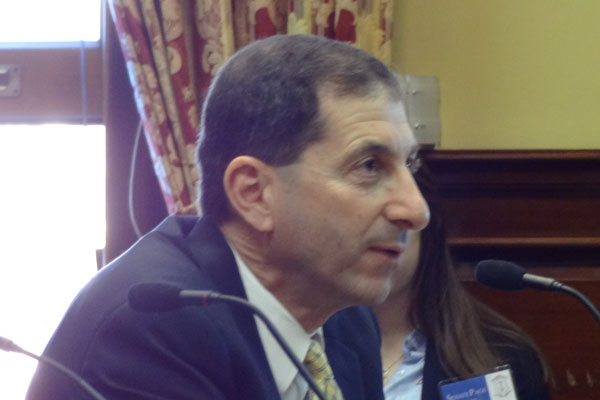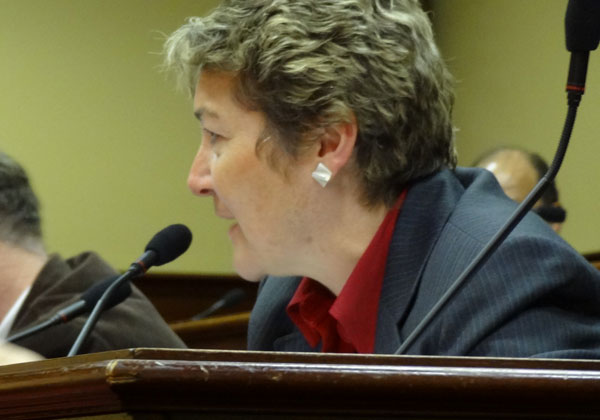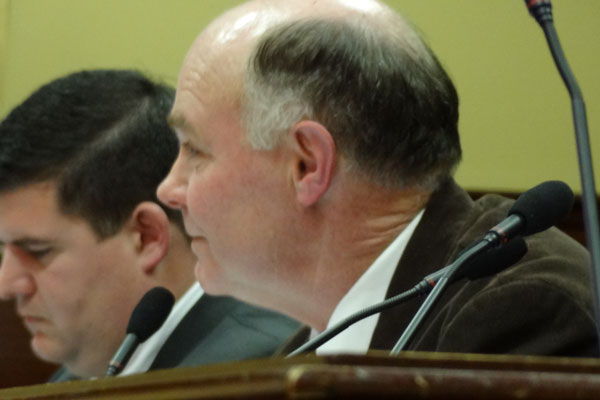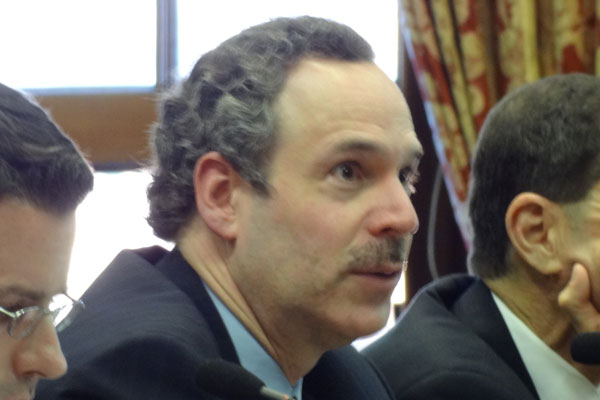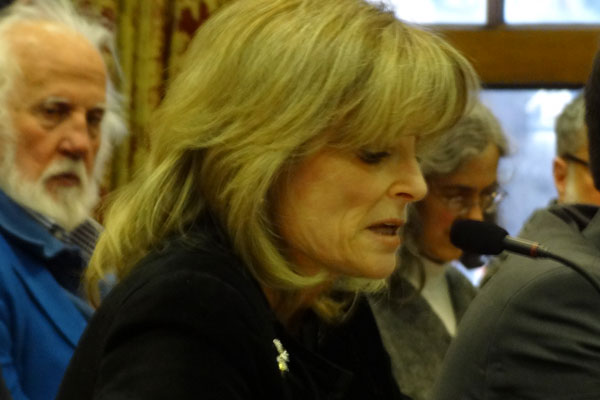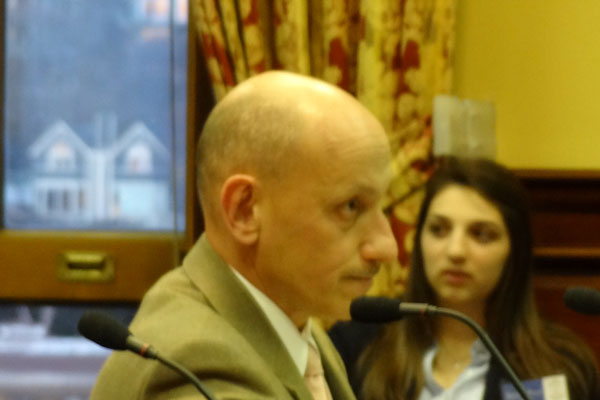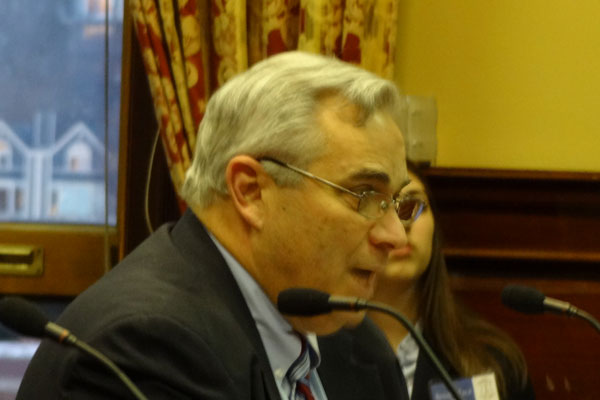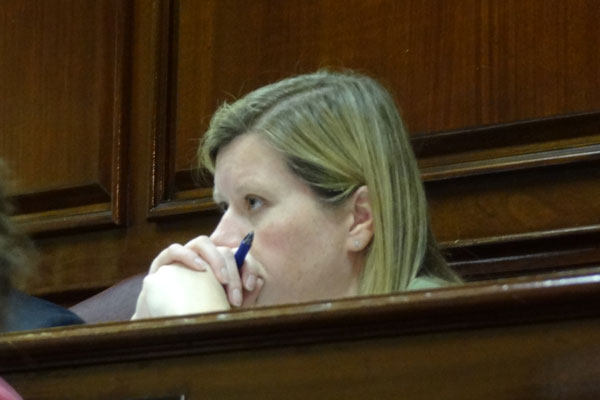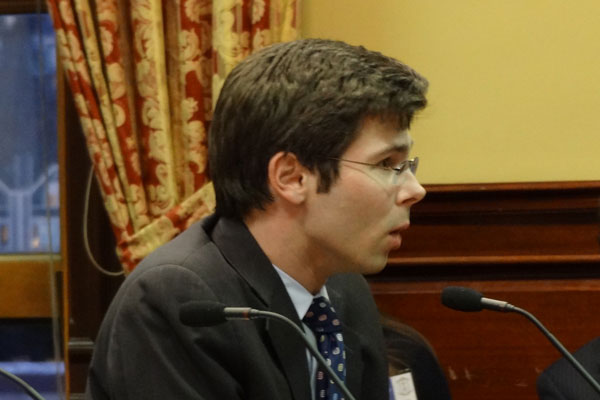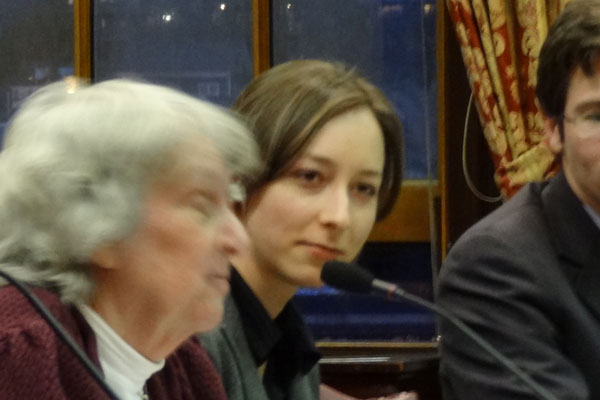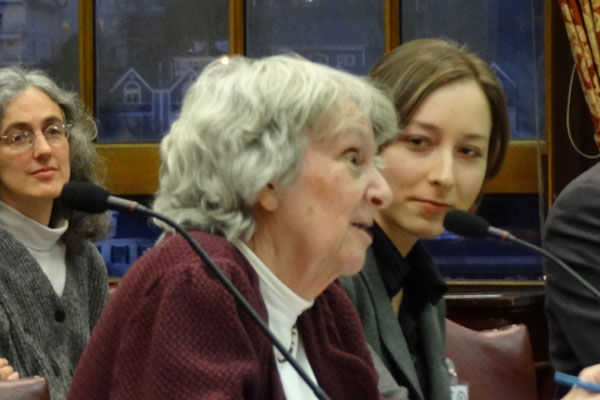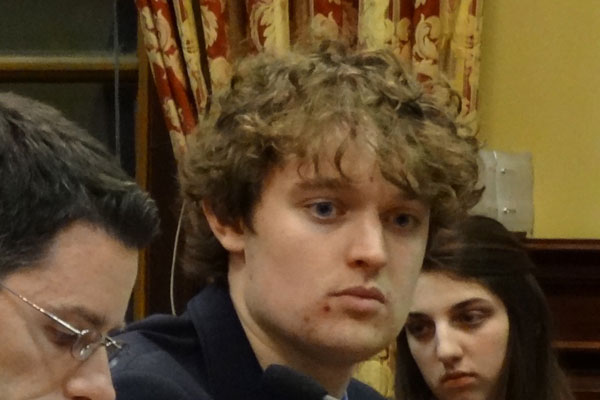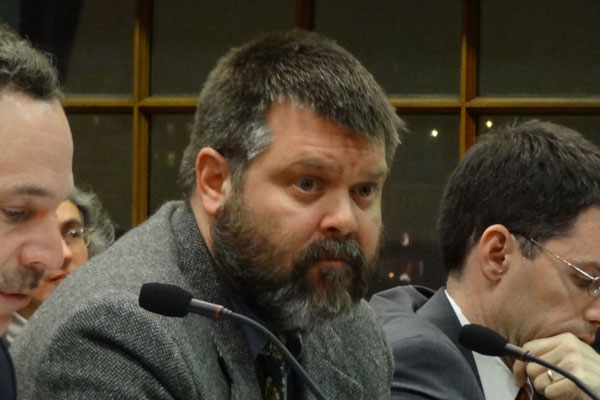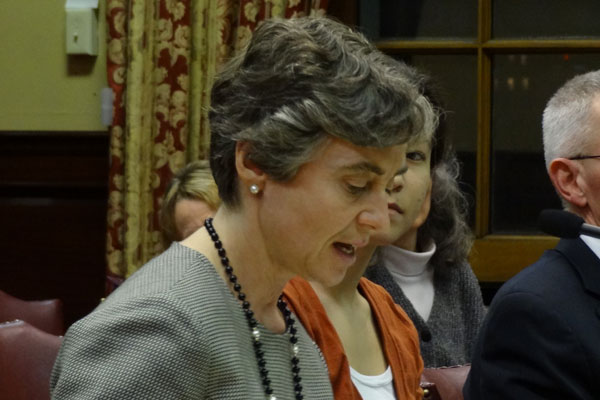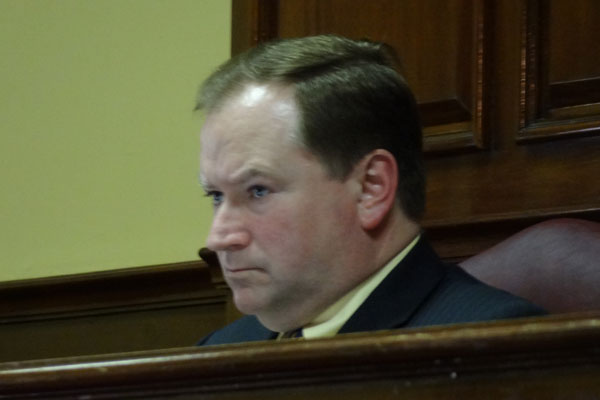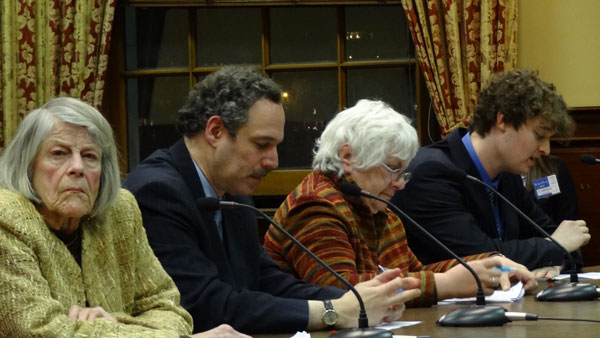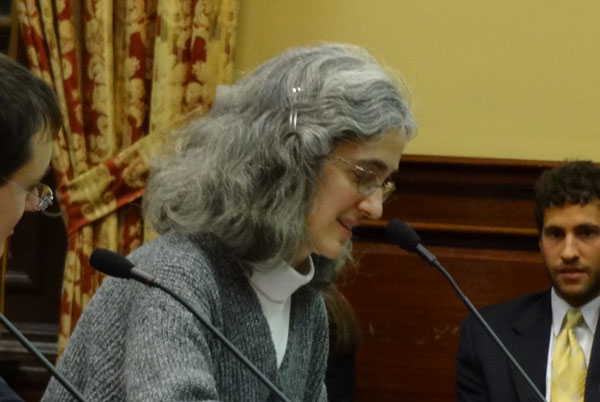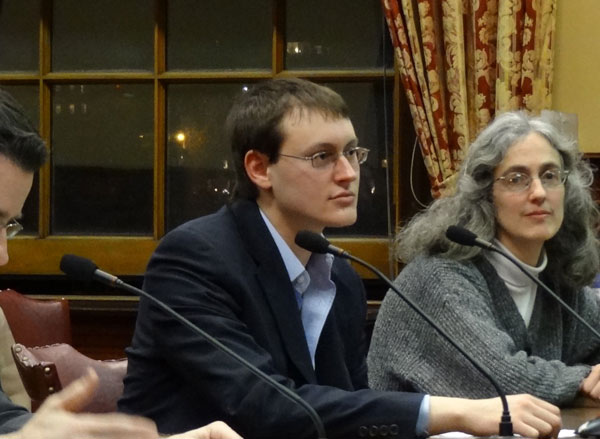03/06/12 – RI Senate Judiciary Hearing
4:52 p.m.
I’m waiting for the Senate Judiciary committee hearing to begin, after having spent a while driving around looking for parking. The press parking was all filled, so my permit didn’t do any good. Fortunately, the capitol police had previously tipped me off that one can park across the street in employee parking once the arms go up.
5:00 p.m.
Robert Benson from Operation Clean Government was the first to testify (for) 2059, which would eliminate straight-party voting.
5:02 p.m.
John Marion from Common Cause testified for, too. The committee is speeding through with no questions. It’s an old topic, by now.
5:03 p.m.
Ken Block from the Moderate Party is also for elimination of the straight-party ticket.
You know, one needn’t come to the State House often to come to understand just how few people there are involved in the state law-making process. A rally in the entry, I think for high taxes on rich people, was attended by just a few people, a whole lot of reporters, and a handful of t-shirt wearing union members. Sure to get lots of coverage, but not with much basis of broad publicly expressed sentiment.
(I didn’t check the fine print, but I don’t believe RITE stands for “Rhode Island Taxes Excessively.”)
Senator Metts commented that his father always knew what party was for poor people and what party were for rich. (His grandparents were Republicans.) People may not know the specifics and all the complicated political things that candidates fight about, but people know which party “is going to put food on the table.” He doesn’t think he’s riding anybody’s coattails; he thinks it’s the other way around.
John Marion replies that the “master lever” might have made sense when it was actually a master lever that visibly pulled all of the smaller levers for the party.
5:09 p.m.
Sen. Dawson Hodgson argued in favor of removing the lever, noting that poorly informed voters might not realize that non-partisan or ballot question votes don’t get made with the lever.
5:12 p.m.
Lisa Blais from Ocean State Tea Party in Action argued that it shouldn’t be an argument about protecting partisan politics, but “enabling people to make an informed decision” — posing it as a matter of education.
5:13 p.m.
Michael Puyana from the Rhode Island Tea Party is offering some lingering testimony, even though the committee pretty much already (very quickly, and very quietly) pushed the bill toward further study.
5:17 p.m.
Held for further study. Next 2489.
5:19 p.m.
Robert Kando, Executive Director of the Board of Elections, is arguing for the bill, which increases the size of voting precincts, saying that large, complicated voting methods used to require limits in number of booths, whereas now, there are plenty of large locations and the “booths” are so small that it would better allocate resources to enlarge each location.
5:24 p.m.
Committee Member Donna Nesselbush asked how much the bill would save.
Kando replied that, with 4,000-person precincts, the total savings over 8 years is close to $4 million between state and local governments.
5:26 p.m.
Sen. Metts worried that voters have become very accustomed to their voting places. Kando explained that, after the primaries, redistricting will be shuffling around precincts, anyway.
I’d note that, at least in Tiverton, they’ve done some shuffling, for other reasons, and I assume it’s a periodic thing from town to town.
5:28 p.m.
The committee just voted to approve substitute A, which lowers the precinct numbers from 4,000 to 3,000. Sen. Glenford Shibley observed that the savings would decrease accordingly.
5:30 p.m.
ACLU’s Steve Brown thinks there’s too much going on with voting (including voter ID) that advise against the change.
5:32 p.m.
John Marion expressed Common Cause’s concern that this would move RI from the middle of the pack, nationally, to near the top (noting that his research had to do with the 4,000 number, not the 3,000 number).
This, by the way, is government. Whether you’re in a town hall or in the State House. Long, somewhat dull debates about minutia that very few people really care about.
Marion, let it be noted, gave a plug to the efficiency of free markets… stating that elections should not be similar.
5:35 p.m.
Hodgson asked how many states regulate precinct sizes, and Marion counted them at 29.
Shibley points out that a city could determine for itself how many people their polling spaces can accommodate. He stated that no cities or towns have objected.
Indeed, the next speaker is from the federation of town clerks, and she is arguing for the bill, waving a letter from Cranston Mayor Allan Fung and touting the savings. $1,000 in Jamestown; $33,000+ in Providence for a general (not presidential) election.
5:42 p.m.
She says that another benefit is that more people (up to 10%) will opt for mail ballots.
5:45 p.m.
Kathy Placencia, board of canvassers in Providence, has resolutions from all of her peers in the other cities and towns. She argues that there would be no problem increasing the number of voters per precinct, in part because nowhere near the full electorate ever comes out to vote.
5:48 p.m.
Vice Chair Paul Jabour asked whether the constituencies in a particular precinct (say, one with a number of elderly residents) would be taken into account. The witness says certainly.
5:49 p.m.
Sen. Maryellen Goodwin says that she wouldn’t vote for this if it were just for money savings, but if it will be about efficiency, she might consider it.
[As a side note, I’m wondering how valuable it is for me to transcribe these hearings in this way. I guess one never knows what will be important down the road, and it doesn’t look like Capitol TV will have any coverage.]
5:53 p.m.
Held for further study.
Senator Crowley gave a quick testimony from the audience, asking who knows better than the clerks what’s best for their towns. Jabour quipped that he thought Receiver Flanders knew what was best for her city of Central Falls.
5:57 p.m.
Moving on, Sen. Lou DiPalma introduced his legislation (2370) bringing absentee ballots for military personnel into line with federal policies.
Somebody from the Secretary of State’s office is explaining that the state wouldn’t, in the future, have to change its laws every time the federal government does.
5:59 p.m.
You’ll never guess: held for further study.
6:00 p.m.
Sen. Erin Lynch introduced her legislation (2333), having to do with the national popular vote.
6:02 p.m.
Two lobbyists who were here a few weeks ago to testify to the corresponding House committee are back again. One, last name Doyle, is explaining that the bill would award all of RI’s electors to the winner of the national popular vote, no matter how Rhode Islanders vote.
One argument is that every state would be relevant, rather than just swing states.
Christine Amora of RI FairVote is arguing in favor. She’s suggesting that Rhode Island would attract more attention under national popular vote. (Actually, RI would have exactly half the influence that it has now, because the electoral college favors us.)
Next testimony: League of Women voters is for it.
Stephen Brown said the ACLU supports it.
Much shorter testimony than in the house… mainly because nobody spoke against.
Held for further study.
6:08 p.m.
Now 2569 is up, expanding campaign finance in the wake of Citizens United. I’ll have an article about this on Thursday.
Sam Shepherd (I think) of the Brown Democrats is for it.
So is John Marion. It’s the “Only policy avenue for the state of Rhode Island” to address the catastrophic repercussions of Citizens United.
“Groups are hiding behind 501(c)4 groups; therefore, citizens are not aware of who it is that’s trying to influence their votes.”
200 people provided $181 million to superPACs.
6:11 p.m.
He notes that the Supreme Court, in Citizens pretty much requested that states do this.
6:12 p.m.
This increases the amount of activity that would fall under restrictions, require more “stand by your ad” messages, lowers thresholds, and speed up reporting requirements. “Lifts the veil of secret money” campaigns in Rhode Island.
6:15 p.m.
Barth Bracy, from RI Right to Life, is testifying against, saying that “this medicine might be very harmful” to organizations like his.
6:16 p.m.
Bracy says the reporting requirements are already pretty burdensome for small organizations, while large PACs have lawyers and funds to meet deadlines. The legislation will keep the small players “out of the game” (which is in line with my view).
6:17 p.m.
Bracy notes that the legislation would require the organization to list the names of its top 5 donors in the past year on every promotion. (Which, I’d suggest, is an intended means of targeting political opponents, at least intended by some proponents of the legislation.) “A lot of people don’t want to be bothered,” implying that they’ll withhold support from groups like his.
He cited the aggression against activists inside the State House at a recent prolife rally and asks how, if we can’t protect them in the rotunda, we can protect them out in public. He wants further study.
6:20 p.m.
In a strange bedfellows way, ACLU Stephen Brown agrees that this law will have the “unintended consequence” of harming small organizations.
In two major ACLU lawsuits, recently, taking on existing campaign laws, were from small organizations finding themselves chilled by the existing laws. He notes that the organizations are not the shadowy groups that the bill professes to address.
He points out that the bill brings referendums into the loop.
Another problem is that the bill brings “electioneering,” which would bring in all sorts of print, audio/video, and so on, to bring people into the requirement of filing reports. He says it’s “extraordinary” in its reach, including names of contributors.
6:26 p.m.
Sen. Metts asks Brown whether a grassroots survey of local voters to publish results about the importance of particular issues to the community would be affected.
Brown explains that, if the published materials can be received by 2,000 people, it constitutes an electioneering communication. If they spend $250 or more, the organization would have to file and disclose donors over $1,000.
Marion emphasizes that there are “thresholds.” $50 for Kinkos copies won’t “get you in trouble with this law.” Additionally, organizations could have segregated funds that would allow skittish donors to hide. (I’d point out that this becomes an advantage for savvy political activists and a hindrance to grassroots.)
Marion says it’s “disturbing” that donors don’t necessarily know who (as in what candidates) the money is going toward. (He’s referring to a statement by Bracy that such was the case for some people who donate generally to prolife causes.)
6:32 p.m.
Marion pointed to an example that (somewhere) 1,800 people protested Target stores because they supported a cause with which the people disagreed. (It seems to me that this isn’t a feature, but a bug; the real effect, here, isn’t to help inform voters, but to out supporters for advocates’ intimidation.)
6:33 p.m.
Sen. Hodgson makes the astute observation that we just heard, from the national popular vote people, that RI is ignored; are we really getting a lot of attention from superPACs?
Marion is describing the results of Citizens United. Long answer… arguing, I think, that it’s too early, but this legislation would get ahead of the curve.
6:36 p.m.
Hodgson: This isn’t going to do anything, as drafted, to control issue messages?
Marion: “I believe you’re right.” Electioneering communication outside of the election window (60 or 30 days before the election) would not be affected.
6:38 p.m.
Marion: “We need a broader definition to capture the activities that are happening.”
Hodgson doesn’t see any way to separate out the “good organizations.” If we try to regulate speech, “it’s a big, big job.”
6:40 p.m.
A new slate of testifiers.
League of Women Voters thinks this bill is a starting point and supports the concept.
Patrick Smock (says he’s usually a social issue advocate). He sees the need for the bill. It “does not appear to stifle any form of” speech, but increases transparency.
Democracy Matters (Emily something) supports.
(I have to wonder, where are the second-tier advocates against this sort of legislation? That seems to me to be an indication that campaign finance is a cause to benefit inside players in the advocacy game, giving them a decided advantage against, and increase the barriers to entry for, people who are just getting involved.
Claire Richards, Gov. Chafee’s executive council, is testifying in favor.
6:45 p.m.
The governor would be very interested in hearing from anybody who has issues with this legislation.
She says the “segregated account” would go a long way to preserving privacy for donors. (Maybe “segregated political participation” would be a good tag for campaign finance legislation in general… just thinking out loud.)
6:48 p.m.
Last witness. Jeremy Ricks, RI Progressive Democrats, supports the bill.
6:49 p.m.
Chairman Michael McCaffrey suggests that anybody interested in this cause work with Stephen Brown & John Marion to create legislation that could pass by the end of the session. For the time being… held for further study.
6:50 p.m.
Three bills moving very quickly to… held for further study.
6:53 p.m.
Last bill, with the Brown Democrat, Stephen Brown, and two others testifying in favor of a resolution for a constitutional amendment regulating political speech.
6:55 p.m.
It’s 2656. Which contains the following language:
RESOLVED, That this General Assembly of the State of Rhode Island and Providence Plantations respectfully urges the Congress of the United States to pass and send to the states for ratification an amendment to the constitution to effectively overturn the holding of Citizens United and it’s progeny and to permit the governments of the United States and the several states to regulate and restrict independent political expenditures by corporations and wealthy individuals.
Next up is someone from Progressive Democrats and Ocean State Action. She’s arguing that corporations are “state-created entities” and do not have rights to free speech. By the langauge above, though, I note, “wealthy individuals” are looped in with the corporations.
“By their very nature, corporations are amoral,” not meant as derogatory, but to note that a corporation’s mandate is to make a profit. (I’m not sure why private corporations aren’t included in her speech or, for that matter, why the people who form and operate corporations can’t take a moral approach to their business.)
7:01 p.m.
Stephen Brown thinks amending the First Amendment is a “dangerous” and “troubling” thing to do. Before he began to speak, I was going to note that the ACLU’s credibility would have been in question if he supported the bill.
“It’s easy to cast all corporations as evil… they aren’t. The ACLU is a corporation. Most of the non-profits that you, as legislatures work with, are corporations. It would be incredibly dangerous to suggest that the federal government has the power to suppress the speech” of such organizations. “Extraordinarily troubling precendent.”
7:05 p.m.
Final speaker doesn’t appear to be aligned with any group: “Congress has become an oligarchic organization governed by the very wealthy few.”
She emphasizes that the resolution seeks to overturn Citizens United, calling the ruling “corrosive” and detrimental to the country.
Here’s my question: If Congress is an oligarchy directed by corporations and this bill would stop that, why would they take the steps of amending the Constitution?
7:07 p.m.
Lisa Petri, a “stay at home mom,” is testifying for the resolution.
7:08 p.m.
She points out that superPACs can put out attack ads without candidates risking the backlash. She also referred to “outside groups” several times. That raises the question, in my view: Who are the “inside groups” in our political process?
7:09 p.m.
She’s giving examples of large groups coming in with expenditures that overwhelm community sentiment when it comes to elected officials’ behavior. I’m not sure that this does that. Look, for example, at the efforts of same-sex marriage advocates in New Hampshire. They flooded the political market with allowable “outside money” from far across the country, from very wealthy individuals and were able to buy officials even without a superPAC.
“Citizens United gives the 1% another way” to exert political power.
A Brown Democracy Matters is up next. Very dramatic speech and delivery… more references to the Occupy movement.
7:13 p.m.
You know, I can’t help but wonder how many of these Brown students are, in practical reality, “outside forces.”
7:16 p.m.
John Marion sneaks in some final testimony. He’s in favor. Not sure what the point is. McCaffrey already called a vote with a voice that suggests he expects passage.
7:19 p.m.
Marion: “Citizens United imagined a world in which independent expenditures were actually independent.” That’s not the case, he says. The majority of the Supreme Court had “no idea” that we’d see all this unlimited money. (I’m curious what his source is for that claim… PolitiFact?)
The “next thing to go” will be direct contributions to candidates, and once that happens, “all is lost.” (Makes me think of the mountains of money that politicians get through inside trading deals, after-office gives, and such. Surely that dwarfs measly campaign donations that are regulable in their expenditure.)
All in favor, except Shibley. (Aw, Dawson…)
7:23 p.m.
And with that, we’re done. Boy, this hearing made a Tiverton Town Council meeting seem like a Wagnerian Opera. (That’s a good thing; I didn’t have dinner, because I had to pick up my children at school before my search for parking.)

